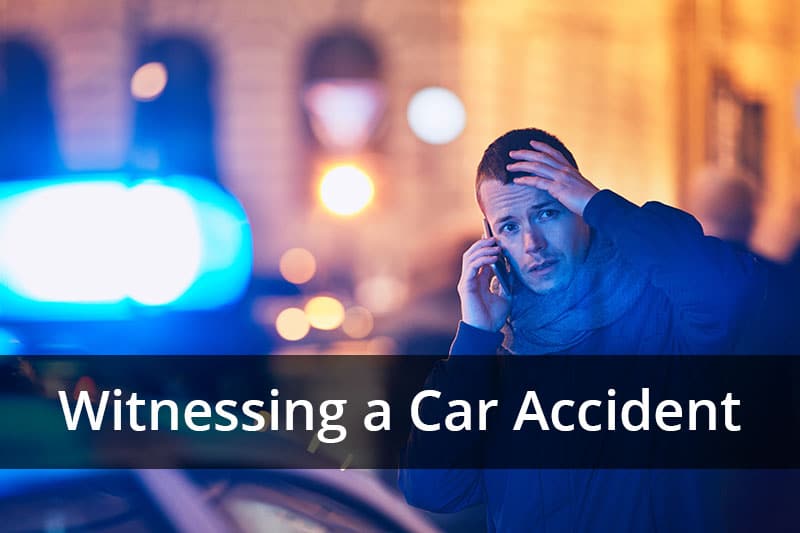A few minutes ago, you were driving along without a care in the world. But then the unthinkable happens: you witness a car accident right in front of you.
Your first thought: “If I left for work just a second earlier, that might have been me!â€
Your next thought: “I hope nobody got hurt!â€
And then inevitably, you ask yourself a flurry of questions: “I think that I should help, right?†“Should I call the police?†“Can I leave the scene if I wasn’t involved?â€
First, know that your reaction and your questions are normal. Witnessing an automobile crash can be traumatic.
But, unfortunately, you probably will see a car wreck at some point. And the fact is that most people want to follow proper procedures and be helpful but are not sure about what to do.
What Do You Do When You See an Accident?
Following is a list of frequently-asked questions many have after witnessing an accident.
In Texas, Is It Illegal to Leave the Scene of an Accident You Witnessed?
Did you ever wonder whether witnessing an accident and leaving the scene was against the law?
There isn’t a Witness Car Accident Law per se in the books, but there are several specific state statutes as well as common sense and ethical standards that you should always follow, which we’ll discuss below.
But first, the answer.
If your actions didn’t contribute to or cause the accident, no, the law doesn’t require that you stop at the scene. You’re not required to provide assistance or make a statement to the police.
So, if you’ve left the scene of an accident that you witnessed, there will not be legal repercussions.
However, most people do feel strongly that stopping is the correct thing to do to help others. They understand that any assistance they can provide may be essential if they’re a witness and among the first at the scene, particularly if they witnessed negligent or reckless driving.
What’s the First Thing You Should Do at the Scene of an Accident?
Always ensure your safety first. Don’t rush to the scene.
If you’re a pedestrian, stay in safe areas such as sidewalks, and avoid shoulders and medians if there’s any traffic.
If you’re driving, pull over to the side of the road. Park at least 100 feet from the crash if there’s fuel leakage, broken glass, metal shards, or other hazards. Switch on your hazard lights or put down hazard markers, and carefully assess the scene.
Remain at a safe distance unless you’re prepared to give aid to any victim—and in the latter case, enter the scene cautiously.
What Are Your Duties If You See an Accident?
Mainly, if it’s unclear whether anyone has done so yet, immediately call 911 and an ambulance if necessary.
Should I Immediately Offer Medical Assistance?
Unless it’s necessary (see below), don’t immediately offer medical assistance in the interim. It’s usually best to wait for trained emergency personnel to arrive—which often occurs in just minutes.
If you’re not trained for emergencies, you could accidentally make the situation more dangerous for the victim.
However, you can offer comforting, reassuring words to the victim and lend your mobile phone to exchange information or to call relatives and insurance companies.
What If There’s an Urgent Need for Medical Assistance Before Help Arrives?
If a victim is clearly in urgent need of first aid that you know you can provide, and emergency personnel has not yet arrived, know that Texas has Good Samaritan laws that will enable you to assist the victim without fear of liability.
If you provide emergency aid in good faith with no intention of harm, you probably won’t be found liable. Yet should you become involved in a personal injury lawsuit, be sure to engage an attorney to defend you.
What Exactly Are Texas’ Good Samaritan Laws?
The purpose of “Good Samaritan†laws is to provide legal protection to those who provide reasonable help to others who are or appear to be in medical crisis, injured, or incapacitated.
The laws are meant to reduce a bystander’s reluctance to help due to fear of being prosecuted or sued for wrongful death or unintentional harm.
Texas and every other state have Good Samaritan laws, which may vary in different jurisdictions. Each has the purpose of encouraging bystanders to assist in good faith if they witness an emergency where one is in peril.
Understanding such laws can enable you to follow your conscience and help people during urgent medical situations without needing to fear legal and civil damages.
The victim or family members cannot hold you legally responsible if your efforts do not help the victim or unintentionally make things worse for the victim.
In Texas, the current Good Samaritan law includes language that applies to volunteer first responders and people who are not certified or licensed in the healthcare field.
Are There Any Exceptions to Texas’ Good Samaritan Law?
Yes, there are several notable exceptions to the law:
- The Good Samaritan Law doesn’t protect people if they’re responsible for the emergency that caused an injury. Even if an at-fault driver provided good-faith medical aid to the victim, they would be found liable for the accident.
- If responders provide aid without sincere intent to assist victims, they’re not acting in good faith. Moreover, if anything they do injures the victims, they can be held liable.
- Suppose a responder intends to harm the victim (called willful negligence) purposefully or has a careless disregard for how their actions may injure others (known as wanton negligence). In that case, the responder may be held liable for the victim’s injuries or death.
- The Good Samaritan law also doesn’t apply to paramedics or healthcare providers who provide medical aid as part of their professional responsibilities and expect payment for such services. Nor does it apply to people at a scene of an emergency who act as agents for others who are soliciting business to provide medical services for payment. In either case, the responders can be held liable for negligence shown to cause a victim’s illness, injury, or death.
If you witnessed a car accident or were unfortunate enough to cause an accident and/or be injured, consider contacting an attorney to determine whether Texas’ Good Samaritan Law protects you.
Should I Give a Statement if I Witnessed an Accident?
Although you’re not required to do so by law, describing exactly what you saw to the police and drivers involved in the crash can be helpful regarding any liability and fault.
- If you witnessed a hit-and-run accident, your statement should include any details that could help the police locate the at-fault driver, including the car’s make, model, and license plate number.
- Enter the details into your smartphone or jot them on a notepad while your memory is fresh.
- Take photos of everything at the scene, including all angles of the cars involved, the points of impact and damage, and the accident scene from a distance, e.g., landmarks, traffic lights, and signs. (If you were involved in the accident, also take a photo of the other driver’s insurance card.)
- As noted above, you must call 911 and an ambulance if necessary since the at-fault driver probably won’t do so.
- Remain on the scene until you’ve completed your statement and the police have confirmed that you can leave.
What If an Involved Driver Tries to Leave Without Exchanging Information?
Never attempt to physically prevent an involved driver from leaving the scene since that could put your safety at risk.
As noted above, write down or enter into your mobile phone the car’s make and model, license plate number, and, if possible, the driver’s contact information. Also, politely ask if you can take a photo of the driver’s insurance card.
If the at-fault driver appears anxious to leave the scene, carefully note that you already recorded the car’s information. In addition, express your concern about possible consequences if he or she doesn’t speak with the police.
What If I’m Not Sure Who Caused the Accident?
If you give a statement, but you’re unable to answer every question, be honest and say that you don’t know. Never guess which driver was negligent and to blame for the accident or any other answers.
Simply stick to the facts.
Do You Have to Go to Court If You Witness an Accident?
If your actions didn’t cause or contribute to the accident and decide to leave the scene, you may not be called a witness in court.
Yet if you agreed to provide a statement, it’s possible you may be called as a witness if the victim’s case goes to trial.
Although it’s unlikely, if you gave a statement to and/or provided police with your contact information, you may need to go to court since your testimony could prove important to the case.
What If I Receive a Subpoena but Don’t Want to Testify?
Many are nervous giving testimony, but remember that if a lawyer requires you to testify, that means you likely have valuable information to provide.
Moreover, if you receive a subpoena—a judge-issued document—that orders your appearance in court, never ignore it. You’ll be breaking the law and could be held in contempt of court, a serious offense that could lead to fines or even imprisonment.
Contact Stoy Law Group, PLLC
Although witnessing an accident can be a traumatic experience, you can be confident that you’ll handle the situation appropriately armed with the essential tips above.
If you have any questions or would like to speak to a lawyer, contact our office today.














